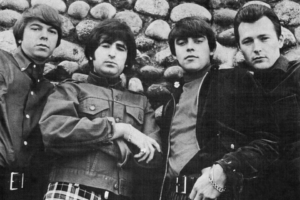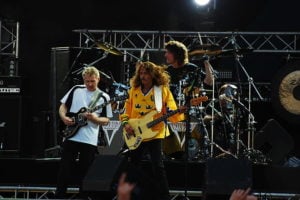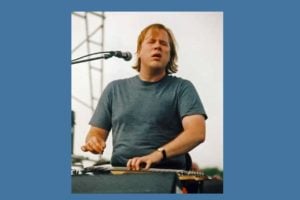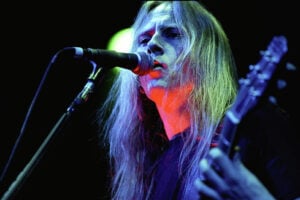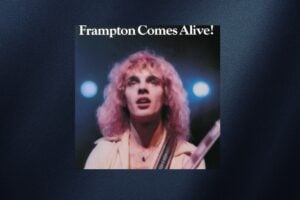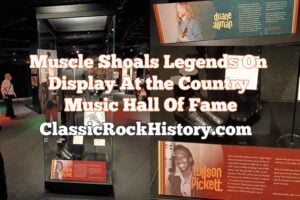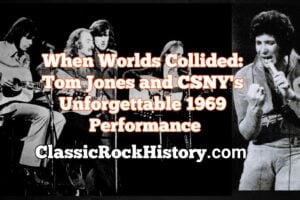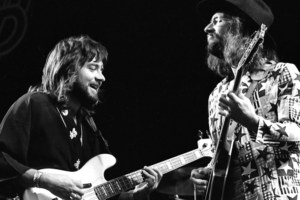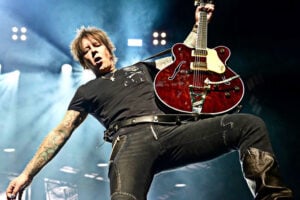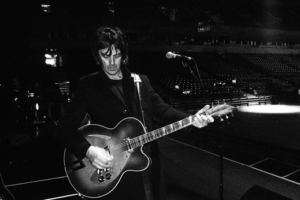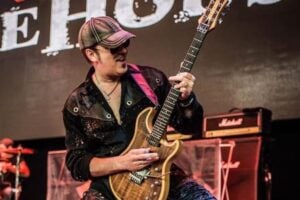George Bernhardt made his name as a reliable session guitarist with a knack for appearing on notable jingles. Looking back on those days, he tells ClassicRockHistory.com, “There was a time that session work was the bulk of my income, which allowed me to put hot dogs in with my Kraft Dinners and Ramen Noodles! [laughs]”
But don’t get it twisted, Bernhardt was all business when it came down to it. “As a session player, you have to have your shit together and be quick,” he says. “Get in the studio, have your cartage set up, your gear, look over the charts, dial up your tones, and pay close attention to what the producer and the client want from you and the TV commercial that we’re now putting music to.”
“Fortunately for me,” Bernhardt says. “I worked with two producers at a jingle company and had a great and fun working relationship with them.”
Bernhardt’s hard work paid off, as he hooked up with Rick Springfield, first appearing in the “Jesse’s Girl” vocalist’s midst as a guitar tech, before joining his band proper for almost two decades. “My tenure with Rick Springfield tops the list in a professional sense,” Bernhardt says.
One can see why. “I got to travel the world with Rick,” he says. “We toured a great deal, and the combined 17-year tenure with Rick was an amazing run for me, not to mention an incredible experience.”
Lately, Bernhardt has been working with his band The Squirts, who have a new album out, III, and which features former Springfield alumni Rodger Carter and session bass icon Matt Bissonette. “Without being part of the Rick Springfield organization, The Squirts would never have come into being, nor would we have met Rodger Carter,” Bernhardt admits. “So, not only am I thankful, but I’m also grateful and very lucky too.
As for what’s next for the veteran guitarist, he shrugs, saying, “I’ll keep going until I run out of gas and/or ideas, whichever comes first, and continue to focus on the long game, not the short game. [laughs] God Bless.”
What’s the story on The Squirts’ new record, III?
The idea for the new The Squirts album and the writing of the album came about during the COVID era. We’d written and recorded songs for the previous two albums that had been filed away and forgotten on a hard drive many moons ago. Legend has it, Rodger [Carter], our drummer, was going through some of his old, filed-away HDs in his studio one day when he ran across some old demo recordings we had completed.
He ran across “The Other Side of Paradise” and a mix of the demo and sent it to Matt [Bissonette] and myself. We hadn’t heard the song in over 10 years and were surprised by Rodger’s discovery of this tune. After a group text and reminiscing about old times and the fun we had, Rodger went there.
He asked what we collectively thought about recording another The Squirts album and the possibilities and logistics of committing to this undertaking. Well, we pondered the idea and decided, “Let’s do it.”
Soon after that group text, the writing and recording of The Squirts’ III album began.
For those who don’t know, how did The Squirts form?
The idea happened at the curb of LAX airport when we were leaving to go do a gig with Rick Springfield. Rodger had just been hired as Rick Springfield’s drummer, and Matt and I had gotten together with Rodger a week or two before and did some recording just for fun. Rodger is a wonderful drummer, and Matt suggested that we get together and just goof off, write some ideas, and see what we come up with.
Not only did we have a blast recording with Rodger, but we also came up with some interesting riffs and just had fun. That day at the curb, Matt jokingly suggested to Rick, “Hey Rick, we’re gonna write an album and record it, and we’ll have it done in two weeks, and maybe we can open some shows for you.”
This was all suggested jokingly to Rick, and we were all giggling, laughing, and carrying on. We actually put our noses to the grindstone and recorded an album. It wasn’t recorded in two weeks; however, we did have one finished in about a month. The first Squirts album was born, and on a casual premise, a band was officially formed. Oh yeah, and we did open a bunch of shows for Rick Springfield as The Squirts.
How did playing with Rick Springfield change you as a guitarist and songwriter, if at all?
I don’t know if I’d use the word “change,” however, I think “grow” as a musician/songwriter and guitarist would be more appropriate. I became very focused and intent on doing the best job I possibly could. And as a songwriter, after learning a good part of Rick’s catalog of hits and songs, I realized how important the story is.
Rick’s an amazing lyricist and storyteller, and an accomplished writer. The stories he tells in his songs, and the opportunity I had to ask him questions regarding his songs and the process of coming up with these great lyrics, were very eye-opening and a great learning experience for me.
And having recorded two of Rick’s albums and co-writing a couple with Rick and Matt was a wonderful learning and growing experience. Venus In Overdrive and Songs for the End of the World were the two albums that I recorded during my tenure with Rick.
Before Rick, you played with a band called Lee Aaron in high school. What was that like?
Lee Aaron was actually my high school band. It too was a wonderful time during high school and the growing and nurturing of friendships and all the hours of practicing, and let’s not forget, he idiosyncrasies of adolescence! [laughs]
Karen was, and will continue to be, an amazingly gifted creative woman who carved a niche for herself in Canada as a female singer and artist. The band Lee Aaron and Karen will always be a special part of my life as a growing musician, songwriter and guitarist.
Early on, you were signed by Irving Azoff and did a lot of session work. How did that shake out?
This was post-Metal Queen with Lee Aaron. I was a hired gun and co-wrote some songs with Frank Zirone for the Hanover Fist project, produced by Stacy Heydon, which ultimately got signed by Irving Azoff at MCA.
Jump ahead a couple of years, and the majority of my session work took place in Los Angeles, California. I worked solidly for two years as a session guitar player in LA and played on countless TV commercials and jingles. It was a very eye-opening and incredible learning experience.
What was your rig like in those days, and how did you generally shape your tone and approach the many different tracks?
At first, I used a Hi Watt head for all the Lee Aaron and Hanover Fist albums. I used a rack-mounted chorus and delay, along with a parametric EQ and a graphic EQ for my tone. It was very ‘80s and was a good-sounding combination of FX & EQs.
I then switched to a Marshall JCM 800 head & cab when I got to Los Angeles—same rack, which I currently still have and use in my studio. My sound is always evolving and changing. During my tenure as a session guitar player, I predominantly used a 1965 Fender Deluxe with a pedal board. Sometimes, simple is better.
The producer would usually give me a heads-up on what they’re going for in terms of sound-wise and style-wise, which was always nice because it led me to be prepared and know what rig to bring to the studio. Session work paid well, and it was the first time in my life that I actually had health coverage from the musicians’ union because I was working so much. [laughs]
What led to your accepting a spot with Rick, which was as a guitar tech at first?
A good friend of mine, Derek Hilland, played keyboards for Rick Springfield for many years. It was a phone call from Derek that led me down the path of being a guitar tech for Rick. I wasn’t working at the time, and Derek gave me a call and asked me if my guitar tech was available because Rick’s guitar tech had left for another gig.
Fortunately for me, the fella I had been using for cartage and as my guitar tech was out on tour in Europe. Derek told me that they were desperate and they were leaving in two days to go do a weekend’s worth of shows with Rick. Derek was reluctant to ask; however, he did, and I’m glad he did.
He asked if I would be interested in just coming out for the weekend and helping out to get Rick through the weekend of gigs. That was the beginning of my adventure and relationship with Rick Springfield. The rest is history, as the old adage suggests…
In addition to session work, you’ve appeared in a ton of jingles. How did you get into that line of work?
Through Gregg Bissonette. Gregg invited me to do a couple of sessions that he had been booked for, and they were looking for a guitar player. He mentioned my name to the jingle company execs, which led to me getting a lot of sessions and jingle work. I’m still very grateful to Gregg for his confidence in suggesting me as a guitar player on some of those sessions.
What are your favorites that you’ve been a part of, and why?
Probably The Mustard Seeds is my most memorable and probably my favorite musical endeavor. It was Matt Bissonette on lead vocals and bass, Gregg Bissonette on drums and backing vocals, Jorge Palacios on drums and backing vocals, Doug Bossi on lead vocals and guitar, and me on lead vocals and guitar.
We weren’t a Christian band per se; however, we were a band of Christians, and that band, in many aspects, changed my life in numerous ways. It was a band of really good men and extremely talented musicians who, to this day, I have a great deal of respect and love for.
When you look back, would you change anything about your career, or do you have regrets?
Nope. Wouldn’t change a thing. Perhaps I should’ve spent more time practicing singing and honing in that gift. [laughs] Okay, maybe I shouldn’t have sold that Fiesta Red 1961 Fender Strat, or that 1976 Anniversary Edition Gibson Firebird… or that 50-watt 1969 Marshall head. Oh, boy! [laughs]
Where do you go from here?
That’s an interesting and tough question to answer. I’m a very small fish in a very big pond here in Nashville. The door is always open, and I always answer my phone. I’m really enjoying working in my studio. I’ve always been a tweaker when it comes to fiddling with pedals, sounds, and amps.
And lately, I’ve really enjoyed fussing with my collection of guitars and tweaking them to perfection. Who knows what the future holds? I’m just happy to still be healthy and alive, and that the Lord has blessed me with an amazingly patient and loving wife, and two incredibly talented and beautiful daughters.
Check out similar articles on ClassicRockHistory.com Just click on any of the links below……
Read More: Artists’ Interviews Directory At ClassicRockHistory.com
Read More: Classic Rock Bands List And Directory











